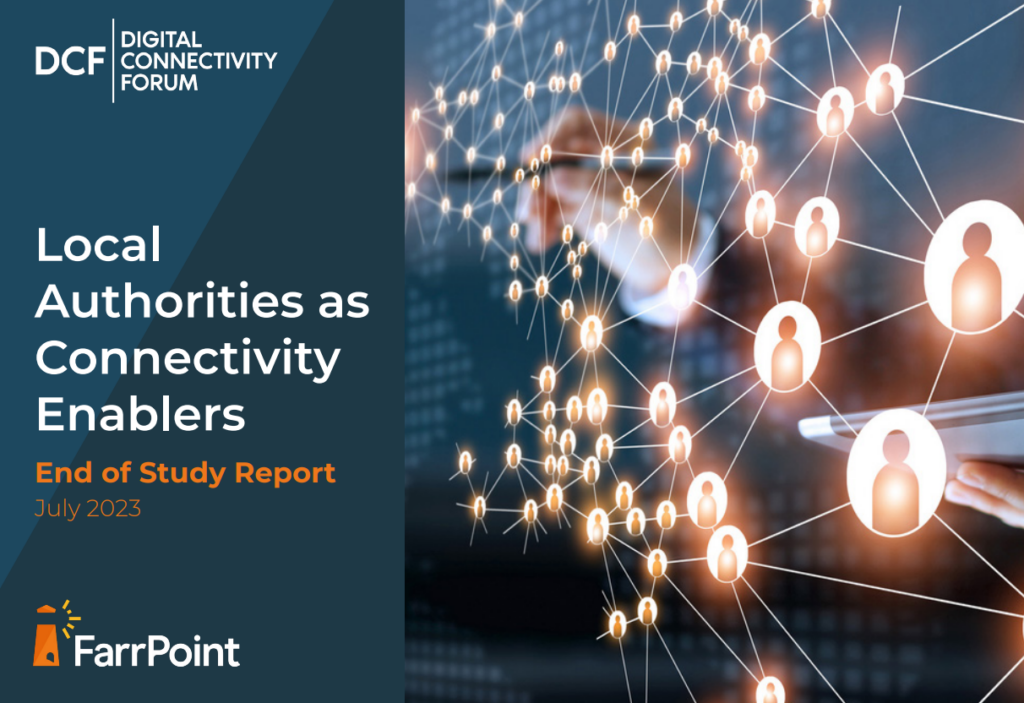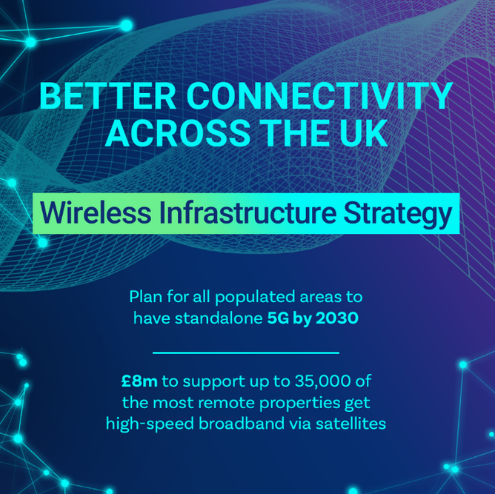On 18th July, the Digital Connectivity Forum (DCF) launched its latest report: Local Authorities as Digital Connectivity Enablers. The report launch took place in London at the offices of techUK and was opened by the DCF Chair, Stephanie Liston before Alex Mather, Head of the DCF, gave some opening remarks. This was then followed by a presentation by Steve Smith, Principal Consultant at FarrPoint.
At a time when much has been done to reduce barriers to the deployment of high-speed fixed and mobile connectivity, both Government and infrastructure companies continue to strive towards the ambitious coverage targets for 2025-2030. Despite many legislative changes in recent years, which has contributed to over 70% of homes across the UK having access to gigabit capable broadband, there remain many challenges at local level; including poor communication and collaboration between local authorities and industry, issues around planning and a lack of consistency of approach across the UK. This discrepancy is leading to prominent levels of variation between local authority areas regarding rollout and access to high-speed connectivity.
The report, conducted by leading digital consultancy, FarrPoint, identifies and discusses these challenges and is the product of interviews with 31 organisations who are involved in the provision of digital connectivity. These included local authorities, fixed and mobile network operators, central and devolved governments, and other regulatory and policy stakeholders.
From this, four main themes arose. These were communication & engagement, planning, street & roadworks and local authorities as landlords and site providers. In total the report makes 27 recommendations that, if adopted across the board could address many of the remaining obstacles that local authorities are experiencing with the deployment of digital connectivity.
Communication and Engagement
Conclusions around communication & engagement included a clear indication of the necessity for a Digital Champion installed across all local authorities as well as the importance of a clear local digital strategy. It was also acknowledged that ubiquitous adoption of Digital Champions is not without challenge as many local authorities continue to operate with high workloads and highly constrained funding.
Other key conclusions included a need for improved education within local authorities about digital infrastructure, in tandem with education for the public on the wider benefits that this infrastructure and connectivity brings to help mitigate public concerns. Communication between local authorities and industry remains a key area for improvement, which has the potential to offer real value in terms of improving the overall process of rollout. It was also identified that improvements could be made in terms of communication between different parts of central government as well as clearly defining the stakeholder roles and responsibility to facilitate direct and open conversation.
The thirteen recommendations which focused on engagement & communication centred around:
- Supporting the role of Digital Champions across all local authorities
- Considering how communication with local authorities could be enhanced
- Developing clear guidance on how all parties could improve communications
- Increasing digital infrastructure deployment knowledge within local authorities to aid decision making
- Ensuring local policies and plans are aligned with national objectives
Planning
Conclusions within planning centred around improving consistency across nations and regions, with a wider consideration of local benefits in the planning process, alongside better feedback for rejected applications. It was noted that planning guidance should, and must, keep pace with technology developments and that updated, and increasingly aligned planning guidance would help accelerate deployment. It was also understood that planning resources are constrained and communication with the public could also help to ease the process, for example a better understanding of the product and not only its direct consumer benefits but wider societal ones could help bridge the gap between public, local authority and industry.
Six recommendations within the subject of planning were made. These were to:
- Urgently review and update planning regulations in Northern Ireland
- Improve consistency of pre-planning processes
- Develop best practice guidance on planning applications
- Review and update the Town & Country Planning (General Permitted Development Scotland) Act
- Undertake analysis to identify trends in planning application rejections to inform future guidance and/or policy
Street & Roadworks
When considering street & roadworks the key conclusion was that variation in noticing and permitting schemes is the largest barrier to deployment with a lack of standards as an area that can cause issues. Within this it was also remarked that regulations could better reflect digital infrastructure requirements as well as improved coordination between both Highways and Operators. There was a general feeling that the adoption of flexible permitting should be increased alongside an improvement in the sharing of infrastructure.
Six recommendations were made in this area. They included:
- Promote adoption of flexible permits to local authorities, including future trials
- Improve consistency of approach to managing street works across the UK
- Increase early engagement with local authorities during the deployment planning process
- Instigate improvement programmes with subcontractors to increase confidence within local authorities
- Investigate the potential benefits within local authorities of adopting a flexible permits approach
Local Authorities as Landlords & Site Providers
Finally, when considering local authorities as landlords & site providers key conclusions were that the use of public assets is varied, with the role of agents as intermediaries requiring consideration and potential reform. Overall, there is a willingness for public assets to be used for deployment and conversations should take place in a constructive and open way to maximise the opportunity for this.
There were two recommendations in this area which looked at:
- Ensuring accurate asset data is available to interested parties, and that the focus is on the wider benefits resulting from digital connectivity rather than revenue generation
- Facilitating access to public sector assets (land, rooftops, and street furniture) and utilising standard templates and guidance for negotiation of agreements
Panel discussion
A panel of expert speakers, providing perspectives from across industry, central government, and local government, then followed Steve’s presentation. Speakers included chair of the panel and of the DCF, Stephanie Liston; Jesam Eyong, DSIT; Belinda Fawcett, Cornerstone; Councillor Mark Hawthorne MBE, LGA; Jo Swarbrick, CityFibre and Steve Smith, FarrPoint.
The panel began with Jesam Eyong, Head of Public Sector Engagement, Barrier Busting Taskforce, DSIT, offering DSIT’s perspective on the report. He outlined that the Department commends the overall tone and positioning of the report in setting out local authorities as enablers of digital connectivity; acknowledging that no local authorities set out to block progress. He added that this framing had laid good foundations for constructive, positive cooperation between local authorities and industry. In addition to this, it was discussed that it is interesting, and positive, to note that recommendations span across all stakeholders within the process, rather than pinning the task of change upon one specific area.
Jesam remarked that it is encouraging that the report holds nothing which shocks DSIT, meaning that it contains items which are ready to be enacted, if not already in progress or in planning (such as ongoing work into flexi-permitting trials).
Overall DSIT welcomed the report and encourages those with questions to contact them. They also encourage that local authorities speak to their highways teams to learn more about flexi permits.
Jesam also highlighted that government is planning a series of upcoming webinars broadly in line with the four themes highlighted in the report and encourages those with interest to enquire about these.
Belinda Fawcett, Director of Property and Estates and General Counsel, Cornerstone then gave her thoughts on the report. She commented that herself and Cornerstone welcome the positive nature of the report and its highlighting of the importance of local authorities within connectivity – recognising them as key players within rollout. Recognition was also given to the resistance that can be caused through lack of understanding, which lends particular pertinence to the report’s calls for increased communication and education between all involved parties. As part of this increased communication there is an opportunity for better engagement to work towards balancing the positive impact of infrastructure against the visual drawback it can have within areas – often a point of contention between providers and residents.
The call for Digital Champions was welcomed, with interest in the suggestion of industry digital champions or single points of contact to complement local authority counter parts. Overall, it was felt that the report emphasises the importance of cohesion and coordination between industry and local authorities to work together to solve issues in a direct and non-legal way.
Councillor Mark Hawthorne MBE, Leader of Gloucestershire County Council & LGA Digital Connectivity Spokesperson, next gave his views from a local government perspective. He welcomed the report and noted, alongside DSIT, that there was nothing particularly new or surprising within it. Councillor Hawthorne noted that the key recommendation within the report was digital champions, with a separate note that funding would need to be provided for these digital champions to enable stretched local authorities to be able to deliver these positions across the country.
It was noted that all four of the key themes involve different departments and improvements across all areas can be built through understanding and communication. To generate this cohesion, local authorities must be bought back into the involvement of processes, enabling them to view digital infrastructure as an investment rather than a generator of community and industry complaints.
Jo Swarbrick, Head of Public Affairs at CityFibre, gave a fixed operator’s perspective to the panel. Jo welcomed the report and stated that he was encouraged by the positive, rather than adversarial, stance it had taken. In particular, CityFibre advocated the role of Digital Champions, agreeing the value they hold for a provider when tasked with the remit and responsibility to join up the different areas involved with rollout.
Alongside Digital Champions there was focus on the various planning points raised, with comment that slow planning is delaying rollout and better communication between local authorities and industry will be vital in assisting this issue, alongside potential government intervention to improve planning application ease.
CityFibre highlighted the value that flexi permits represent to providers, citing permitting as a substantial barrier. If widely adopted, flexi permits could create a better flow of continuous rollout as well as smoothing day to day contact between operators, highways, and local authorities.
Finally, Steve Smith, Principal Consultant at FarrPoint gave his closing remarks to the panel, advocating for a non-adversarial stance between industry and local authority and highlighting the necessity for improvement to keep pace across the whole of the UK, rather than some areas being left behind. To achieve this a coordinated and considered approach will be required. Steve highlighted that more talking is the most positive first step and that from that the remaining issues can begin to be addressed. Steve concluded that he, and FarrPoint, are hopeful that many of the recommendations can be considered and hopefully applied to create a realisation of the vital value presented by enhanced digital connectivity for all.
Stephanie Liston then offered closing remarks, noting the positivity that members of the panel, all representing different parts of the complex ecosystem of digital rollout, were aligned and willing to work together – paving the way for enactment of reform and the driving of progress.
Q&A
The panel was then opened to audience Q&A with questions focusing on varying topics such as digital champions, infrastructure sharing, funding, and industry collaboration.
Is there an opportunity for the Digital Champion brief to be broadened to include helping local communities (particularly businesses) to understand what it is they need to buy and how to fully benefit from the infrastructure provided.
- Digital Champions are holistic in their approach, tasked with considering the wider picture, including how to achieve the benefit of the connectivity for which they advocate.
- There has been feedback showing that those local authorities who have Digital Champions are working well and this support is happening.
- There has been a clear indication that people do need guidance and operators are aware of this, with many (including CityFibre) calling on Ofcom to release such guidance (e.g., What constitutes full fibre).
- Whilst Digital Champions can be a catalyst to digital rollout, they can also be part of embedding digital adoption across the wider local authority and educating on why consumers should care about higher speeds; highlighting the societal and individual benefit that that connectivity brings.
Is industry doing enough to have local authority champions within their own structures?
- The report has identified how important local authorities are to connectivity, alongside how industry needs to provide support for this e.g., who to speak to and where to go.
- The focus can now be placed on either side, allowing for a more balanced view. There is clear value in having an industry champion counterpart.
Are there examples of successful industry collaboration and if not, what can be done to make this happen?
- yes; an area in the south of England has had collaboration between fixed line operators sharing plans with each other.
- If there is a will to work together, there can be results achieved together.
- The National Connectivity Alliance is trying hard to foster communication in this area and came from the access to land workshops convened by what was then DCMS (Department for Culture, Media, and Sport) and is now being run by industry itself.
What is the real scope for collaboration and infrastructure sharing given the current level of overbuild?
- DSIT recognises that they are aware of the issues presented by overbuild, which include removal and damage of infrastructure.
- Change in this area will inevitably take time, as well as a commitment from the operators involved to conduct conversations with honesty and an open and less accusatory tone.
- The Local Government Association (LGA) is trying to understand what needs to be done to have this conversation and considers that often delay is not an issue of will, but of way. The challenge is recognised and there is a solution, but that solution will require recognition of the complexity of the issue.
- Overbuild is already embedded in the connectivity structure.
- The positive position the UK finds itself in with connectivity is largely in place due the competitive business environment that it has.
- There is agreement that collaboration and infrastructure sharing is positive
- Local authorities should also share their own assets (such as roads, roof tops), and work towards asset sharing to providers as well as sharing between providers.
How can industry work with local authorities who are short on resource, such as those who want to be part of the process but cannot or are prohibited from doing so due to financial constraints?
- Ideally there would be central government funding for Digital Champions across all local authorities, with a particular call that every local authority does need funding for this.
- For local authorities to widely adopt Digital Champions they must first see the value in having them (including the wider connectivity, societal and income value).
- This is partially incumbent on the local authorities to be involved in and advocate for this rather than entirely central government owned.
- DSIT highlighted that government very clearly understands the value of digital champions (and would have them embedded everywhere in an ideal world) – however, until decisions are made in central government to fund digital champions across the UK, we must be pragmatic in our approach. It is possible to focus the structure to accommodate these changes, however it takes a lot of patience and work, and Government acknowledges that this balancing is not at all easy.
The report launch concluded with thanks and closing comments from the DCF, and report launch chair, Stephanie Liston.
The Digital Connectivity Forum would like to take the time to thank all those involved in the report, including those who were interviewed, the panellists, FarrPoint and those who attended the launch event. An insightful report has been produced which presents value to a wide range of stakeholders and will hopefully lead the way to a more cohesive and connected connectivity future.















